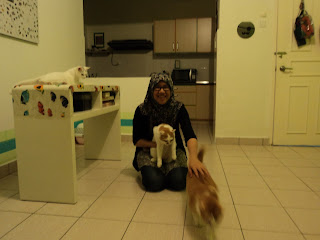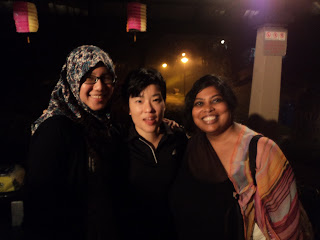1. Make a new friend
I have been a regular volunteer at Beacon of Hope for almost one year now and had previously communicated mostly only with the students and the coordinator of the centre, Mr. Henry. Recently I got to know some of the other teachers better, including Zubaidah, who teaches at a regular school in the daytime and has a severely disabled daughter. It is admirable that she teaches at Beacon in the evenings despite the challenges she is facing. My day job of drafting legal documents and opinions must seem like such a doddle compared to hers.
Nadia is a Homeless Hairwash volunteer who I took an instant liking to. She is young, passionate, helpful and really fun to have around. I invited her to my Mid-Autumn Housewarming Party and she turned up with ratatouille and made friends with everyone including my parents and my cats. She's the kind of girl who gets invited to everyone's parties.
For my Mid-Autumn housewarming party, I invited friends to bring their partners or a friend, and so I was introduced to 3 guests who I have not met before -- Winnie, who is Shirlyn's sister; Dishen, who is Shamini's partner, and Gibran, who came with Shyam. They are really lovely people and I am glad I extended the invitation to them. Dishen is especially helpful, and Gibran is such a charmer.
2. Help a stranger.
(i) I coordinated the Shoebox Project in 2009 to collect shoeboxes filled with school supplies and toys for refugee children, and this project apparently so inspired my friend Lisa that she decided to coordinate a Shoebox Project to bring gifts to Orang Asli children in indigenous communities this December. I was happy to contribute and filled up two 5-litre food storage containers (I didn't have clean empty shoeboxes at hand, and besides, these boxes are useful and sturdy) with school supplies, pocket board games and other practical and fun items for children of either gender within the 6-13 age group. I am really pleased with my boxes although I went way above budget and will be proud to deliver them to Lisa soon. I know these boxes will bring joy to the children and some financial relief to the parents who will not have to spend as much on school supplies for the upcoming school year.
(ii) Through The Revolving Library's volunteer Facebook group, I got to know of the plans of Teach For Malaysia fellow Rachel Lim to raise funds to take her students, who had worked very hard to learn English all year, on a trip to Kuala Lumpur. The students would require the sponsorship of RM250 each and the trip would widen their horizons and open up a world of new experiences to them. I spread the word on Facebook and chipped with funds to help her plans materialise. Within a week, she had raised enough (I think! I hope!) to ensure that none of her students (who live in a rural community and cannot afford the trip otherwise) would get left out of the trip.
(iii) When I learned that the Kuala Lumpur Bar Committee was collecting books and magazines for the prison library from 20th Sept to 7th October, I sorted through my books and magazines for reading materials suitable for mostly working-class men of subaverage literacy levels. I know they would prefer non-fiction, and magazines pertaining to natural history, travel, science, mechanics and spports. I even parted with some of my prized collection of World Cup souvenir magazines because I know many of them are football fans and would enjoy reading about their favourite sport and players. Back issues of Malaysian Naturalist would also be appreciated because there would be pictures of wildlife and birds they can identify, or marvel at. I lugged a huge bag of reading materials to the KL Bar Office after court in late September knowing that these books and magazines would be put to good use.
Frustratingly, though, when I shared the appeal on Facebook, many friends offered to 'donate' completely unsuitable reading materials such as romance novels, old textbooks, outdated business magazines and toastmaster newsletters. I fired off a sarcastic response because I am frustrated that many people do not think about the recipients or beneficiaries when they want to make a donation. They just want to declutter and get rid of their things as expeditiously as possible without thinking of whether there is a more suitable recipient. Despite their university degrees and certificates, a lot of educated people can show a grave lack of practical intelligence and awareness of the needs of others. I hope people will put more thought and consideration into the things that they wish to give to charity. Give something because it will benefit a disadvantaged or needy individual or cause, not because you want to feel good about having contributed and want a
convenient way of getting rid of clutter from your home.
(iv)
Aravind and I have been trying to catch two kittens, one of them injured, from the flats near his home for veterinary treatment and spaying. Although we failed to catch the kittens in September, we managed to catch another one, a young adult calico, for spaying before she could get pregnant. I named her Frida Kahliko and Aravind thought it was a good name. She was duly spayed and cared for and has been returned to the apartment car park, where she is living a reasonably good life with Aravind feeding her and the other stray cats and dogs every day.
(v) On 26th September, I coordinated a visit-and-volunteer session at the TTDI Edible Project and recruited close to 30 volunteers to help them weed and clear up their community edible garden.
(vi) Apart from the above new beneficiaries and causes, I have been helping out at the SPCA shelter, Homeless Hairwash, Beacon of Hope community tuition centre and the Malaysian Nature Society on a weekly basis as usual.
Due to the haze, I bought Beaphar lubricating eye cleaning solution for cats and dogs and cleaned the eyes of all the SPCA animals to reduce the risk of eye irritation due to the annual Southeast Asian haze. ASEAN countries have been discussing a solution to the transboundary haze for years but lack the political will to take any concrete action. We are beginning to see citizens' groups instituting public interest litigation against the plantation companies reported to have been involved in forest clearing in Indonesia. I wish them every success and will lend them all the support I can.
Although this is not a new cause, we did something different at the Malaysian Nature Society Urban Nature Centre in September. Under Koon Hup and Balu Perumal's guidance, we are converting the wasteland behind the Urban Nature Centre into a seed bank and community garden. Aravind and I joined the other volunteers in clearing the place up of rubble, litter, old construction materials, fallen branches and weeds. It was messy and tiring work, and not very rewarding just yet because it's not quite ready for planting or visitors yet, but hopefully after a few more visits it will begin to look a lot more presentable, welcoming and garden-like.
3. Eat something/at someplace new to me.
I drove down to Taiping with Aravind for the Malaysian Nature Society Annual General Meeting in early September and we ended up eating in several nondescript little restaurants, food courts and stalls in Taiping Town. I even had a cuboid ice cream cone in the Taiping Lake Gardens. What rum.
Karen took me out to dinner at Hadramawt, The Curve, in exchange for my agreement to house-sit and cat-sit for her for two weeks. We had Mulawah bread, spice-infused hummus and vegetable stew. It was crazy good and reasonably priced.
4. Go someplace I've never been.
I've been to Taiping on two occasions, and this time, although I stayed in the Flemington Hotel in the Taiping Lake Gardens again, I attended the MNS AGM at the Taiping Perdana Hotel. It was in a different part of town, where most of the government offices and cooperative shops are located. That night, Aravind and I decided to skip dinner at the hotel (since it did not look in the least promising and had already run out of lunch for us when we arrived) and drove to Kuala Sepetang after making an appointment with a local boatman for a firefly tour. Unfortunately, it rained and stormed like crazy at nightfall and so the boat ride had to be called off. Well, çést la vie. That's the way it is with nature. There's always next time. We ended up exploring small shops on the way back to town, including a wholesalers selling local snacks and sweets. I ended up buying four packs of illustrated erasers for my students at Beacon. Those kids occupy my mind even
when I am away.
In September, I also attended KL Car Free Morning, which technically doesn't fall in this category since it is an event and not a place. Still, I've never cycled in the middle of the road downtown and it felt very liberating and exhilarating to do so. I also bumped into many friends from volunteering and greenie circles and my yellow bike made a lot of new friends as well.
On the 26th of September, I coordinated a visit-and-volunteer session at the TTDI Edible Project and thus visited the community garden in real life for the first time after following them on Facebook for over a year.
5. Learn something new.
In September, I learned how to load and unload my bike into/from my car quickly for trips and events.
6. Declutter and cull 25 items.
Now that I've moved out of the landfill I used to rent with two of my friends, there isn't much for me to declutter here. I try to declutter the parental home on my short visits there on Sundays, but it isn't every Sunday that I have the time to spring-clean. In September, I sorted out around 40 books and magazines for prison library.
I also went through my collection of football socks and removed 8 pairs of almost-new socks for Kedai Jalanan. Our homeless friends have been asking for socks because mosquitoes have been biting their feet at night. Some have skin conditions that need them to apply ointment and antifungal creams on their feet and legs and put socks on to stop the ointment from rubbing off too quickly. I hope my socks will bring them some small measure of comfort.
8. Give up something for a month.
In September, I gave up cleaning my Wee Green Flat more than once a week. After a few months of living on my own with my cats, I realised it is sufficient to mop the floor and wipe all the surfaces and clean the bathroom only once a week for each task. My previous rented home never felt clean even though I mopped twice or thrice a week, thanks to housemates who tracked dirt and clutter in several times a day.
In September, I also took a month-long break from DIY and home improvement projects and just enjoyed being in my apartment without feeling the need to break apart or remodel something.




















































